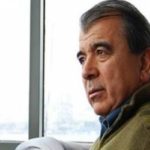In 2016, the Turkish government falsely accused me of planning a coup. Five years later, these charges are still upending my life.
Five years ago, I went to bed a scholar and woke up the perpetrator of a coup.
With no evidence, the government of Turkish President Recep Tayyip Erdoğan has formally charged and prosecuted me for inciting the failed 2016 coup. A warrant has been issued for my arrest. I am part of a large and expanding group of alleged co-conspirators, the most famous of whom, Osman Kavala, one of Turkey’s most prominent civil-society organizers, has now spent years in jail for crimes he did not commit. The government is seeking life sentences plus 20 years for each of us. The Turkish authorities’ proof is invented and their reasoning is nakedly self-serving. But in the context of an authoritarian regime, none of that really matters: They control the press, the courts, and public opinion.
The accusations have upended my life. They have lost me friends and professional contacts, as well as the ability to return to my homeland. But they have also taught me about how conspiracism works on a procedural level: how it starts, how it spreads, how it can turn the mundane suspicious and the innocent guilty.
In July 2016, I traveled to Istanbul—where I was born, though I am now a U.S. citizen—for a workshop that I had organized in my capacity as the director of the Middle East Program at the Woodrow Wilson Center, a Washington, D.C., think tank.The workshop was intended to explore Middle Eastern reactions to President Barack Obama’s Iran nuclear deal; Istanbul was a convenient gathering place for scholars from the region.
We met at a historic hotel on Büyükada, an island an hour away from Istanbul. The day of the attempted coup, some of the conference attendees and I stayed in the hotel’s television room late into the night, trying to make sense of the events while also taking calls from an inquisitive international press. When it became clear that the coup had failed, we proceeded with the workshop over the next two days, as scheduled. Afterward, I spent some time in Istanbul before returning to Washington.
And then came the articles. They appeared in the government-controlled press and contained all sorts of details about my trip to Turkey—including information available only to the authorities, such as the precise times I had cleared passport control at the Istanbul airport—that supposedly implicated me. They also cited oddly worded “interviews” with hotel staff on the island and detailed my supposedly nefarious activities, which included fielding phone calls from the U.S. and other international media.
If this sounds outrageous, it is. But it may help to understand that in Turkey, everything can be explained by conspiracy, specifically a conspiracy to prevent Turkey from becoming a world power. The perpetrators and particulars of the plot are always changing, but the idea has become central to the country’s political language. It is impossible to watch television without encountering a talking-head show whose panelists expound on any number of plots that have prevented Turkey from becoming a world power; if you want to denigrate a rival, all you must do is accuse them of perpetrating one of these plots.
The story, according to what I was reading from my home in Maryland, was that I was in cahoots with the coup’s accused primary organizer, the cleric Fethullah Gülen, who had been instrumental in helping run the Turkish state until he and Erdoğan had a falling out. (He has denied the charge and now lives in exile in Pennsylvania.) Washington has refused, for lack of evidence, repeated Turkish requests for Gülen’s extradition. In the Turkish imagination, such refusal is tantamount to proof that he must be an important asset Washington wants to protect.
And I provided a convenient means through which the Turkish government could construct the narrative—still in play today—that the U.S. government was behind the attempted coup. I had served on the U.S. State Department’s policy-planning staff and was therefore known to have extensive contacts in Washington. Just to make sure that there was no doubt about the U.S. government’s complicity, the Turkish authorities also asserted, with great confidence, that I was a CIA agent.
With time this narrative was embellished, and new “details” were added about my perfidious behavior. Some were mundane: Apparently, I had bequeathed a tiny bell embossed with the word pennsylvania (presumably suggesting a connection to Gülen) to the hotel on the island. (Needless to say, I didn’t.) Some were more pernicious and absurd: I had allegedly engaged in elaborate plots to kill people and help other CIA agents escape.
Others were even more absurd, almost farcical: The authorities seem genuinely puzzled by the fact that I twice stayed in hotel rooms with one Ellen Laipson; for the record, she happens to be my wife. (She served as an analyst at the National Intelligence Council, but what threw them off was much more quotidian: We have different last names.) A Turkish newspaper ran a story about how Scott Peterson—who had been convicted years earlier of murdering his pregnant wife in California and since 2005 has been imprisoned at San Quentin—had been dispatched as an assassin by U.S. authorities during the attempted coup in exchange for leniency. We did indeed have a participant in our workshop named Scott Peterson. He is the Christian Science Monitor’s longtime Middle East correspondent. Whereas all participants were identified by their affiliation in the hotel’s roster, his had not been entered into the hotel records, because he had joined us late. In an effort to identify him, the enterprising Turkish journalists must have Googled him. In fact, if you do Google that name, the first entry you will encounter is about the murderer. Factum est.
At the time that I was first being accused of these crimes, Kavala was being tried, also on fabricated stories linking him to anti-government demonstrations in Istanbul back in 2013. When his initial prosecution collapsed for total lack of evidence, the authorities claimed that he had conspired with me to plot the coup, thereby giving themselves an excuse to extend his detention. He has been in jail for more than four years despite the European Court of Human Rights’ order for his release. His next trial is scheduled for late November.
The evidence keeping him in jail? Three days after the coup attempt, we had a chance encounter in an Istanbul restaurant, where we chatted briefly, as we both were meeting others for dinner. But the indictment claims that he and I have been in extensive contact with each other, and that we have conversed for hours on the telephone. The authorities make this accusation while readily admitting that they have no direct record of any call between us. They couldn’t, because we have never called each other.
Most of the indictment rests on irrelevant coincidences like this one: On one of my trips to Turkey, I went to the southern city of Adana and Kavala went to France on the same day. Similarly, on another occasion, Kavala went to France three days after I had returned from a trip to Turkey. This has been used as proof that we knew the coup was in its preparatory stages. We all know how conspiracy theorists invent narratives, but maybe less appreciated is how banal the material can be, how something as boring as travel plans can be made nefarious.
The indictment is particularly fixated on a visit George Soros made to Istanbul in 2015, some nine months before the coup attempt, when he met with Kavala and İshak Alaton, an industrialist who has since died. (No conspiracy theory today is complete without a Soros appearance.) Apparently, this visit coincided with an ad in a pro-Gülen newspaper that featured a baby. The “Smiling Baby” ad, the prosecutors allege, again with no proof whatsoever, was a signal to Gülen’s followers to put the coup into motion. This connects Kavala, Alaton, and Soros with the coup and is deemed so important that it is mentioned at least three times in the indictment. I, too, am wedged in: According to news stories, I warned Alaton a week before the coup attempt that it was in the works.
The prosecutors readily admit that they cannot provide concrete proof of my coup-related activities. Their explanation is bizarre and Kafkaesque: Apparently, as an intelligence agent, I know how to cover up my tracks and use clandestine methods of communication and travel. Hence, I am guilty. The indictment laments the fact that they could find no hotel records for one of my trips to Adana—but in reality, there were none for them to find, because I stayed at the U.S. Consul General’s residence. The conspiratorial mind operates according to a warped sort of logic, one in which no amount of exculpatory evidence is enough, and arguing for your innocence only makes you more guilty.
I have chosen not to dignify these machinations with a response, and I have no one representing me in court. But the truth is, this whole experience has taken a severe toll on me professionally and personally. Conspiracy theories are powerful; those propagated by governments, even more so.
I will likely never again see my ancestral home—the place where my grandparents are buried, where my parents’ ashes are scattered. I have been used to keep an innocent man in jail, and I worry that his supporters blame me for his predicament. Many of the people and institutions I thought were in my corner have abandoned me. I left the Wilson Center when its leadership did little more to defend me than issue a couple of statements.
The Turks have pressured Western think tanks to not invite me to their events. I have spent my career working on Turkish and Kurdish geopolitics, but I can no longer travel to Turkey or apply for research grants on these topics. I have been warned, including by senior officials in Iraq, that traveling to northern Iraq could become a problem for me because, as Freedom House reports, Turks engage in forcible renditions there.
I have lost contact with friends and academic colleagues in Turkey, who are understandably worried for their own safety, because the Turkish government prosecutes anyone it feels like, whenever it is convenient. Recently, a very good Turkish friend who used to live here was in town. She called me using her ex-husband’s phone and apologized for her lack of contact over the years: She said that, for her own security, she’d had to wipe any references to me from all of her digital devices.
More than five years after the coup, people in the Turkish media—print, television, and social—still insult me and propagate these falsehoods. In July, in one of the country’s major papers, a columnist I had never heard of dedicated a whole column to my “deeds.” Since then, the Turkish press has continued to publish similar articles about me.
I am used to these attacks, but I still find them unnerving.
On the level of the individual, conspiracies are the weak man’s explanation for developments he cannot or will not understand. But on the level of the state, they’re powerful weapons. They are invented and cynically exploited by leaders for purposes of self-gain, obfuscation, and sheer mendacity. In Turkey, they have a saying: Damlaya damlaya göl olur—“drop by drop you build a lake.” Five years into this ordeal, the lake has become an ocean.
Henri J. Barkey is the Cohen Professor of International Relations at Lehigh University and an adjunct senior fellow for Middle East studies at the Council on Foreign Relations.
Source: The Atlantic



